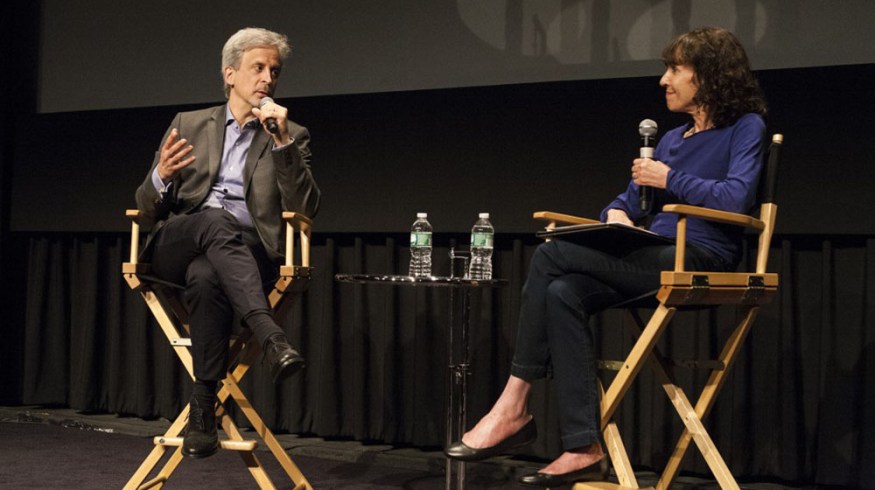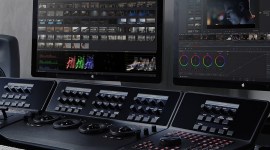
Film Editing Lessons from Oscar-Winner William Goldenberg
Feature film editor William Goldenberg’s panel chat at the annual Sight, Sound and Story event was full of fantastic insights and anecdotes. Here’s some of the highlights.
Feature film editor William Goldenberg sat with Bobbie O’Steen as part of Sight, Sound and Story’s annual New York City event presented by Manhattan Edit Workshop on June 13th. William Goldenberg has a storied career, with film editing credits including Argo (for which he won an Oscar), The Imitation Game, Zero Dark Thirty, Transformers: Age of Extinction, Seabiscuit, Pleasantville and Miami Vice, just to name a few. He had tons to say about his experience working with directors and other editors, as well as the craft in general. Here are some highlights:
“It’s taken me a whole career for me to gain confidence. I think my insecurities, wanting to make everything perfect, are what makes me good at editing. It seems with every film I’m as terrified as I was when I started 22 years ago. Every film creates its own set of problems unique to that film. Often, there are sequences in films where you don’t know how to put it together. When I look at all the footage for a scene sometimes, I think, ‘Where do I even start?’ You get that anxiety feeling that never really goes away.”
On apprentice editing on The Breakfast Club, where he observed editor Dede Allen at work…

“I was around her long enough to get a lot of pearls of wisdom, like how she conducted herself, the things she said, how she took charge of the film and bent it to something she wanted it to be. She laughed at the ‘rules’ of editing. She’d make a cut and you’d say that that broke the rules and she’d laugh like it was the funniest thing in the world. It was a huge deal when I got credit on The Breakfast Club, because she wouldn’t tend to give apprentices credit. The first cut of the film was three hours and forty minutes long and she cut it down basically by herself.”
On working with veteran editor Michael Kahn…

“It was like free graduate school at the highest level. He really took it upon himself to help me. He used to say, ‘You don’t know you’re talented. I do.’ When somebody like that says that to me, I couldn’t believe it. He taught me his methodology, how he approached scenes, how to handle myself politically, how to take criticism, which is probably the most important thing I learned because it can be painful when people don’t like things that you’ve done. When I was working on a scene from Alive he gave me all these notes. He made me recut it something like twenty times. He just kept giving me more and more changes, and I finally said to him, ‘I just don’t think I’m very good at this. I’m clearly not getting this right. You always have notes and I’m not making you happy.’ And he said, ‘It has nothing to do with the scene you’re cutting. I’m just trying to get you to learn how to take criticism.’ It was the most valuable thing I ever learned. Criticism is about the film, not about you. You have to take criticism with a smile, say it’s a great idea, and hope it sparks another great idea. Take it in a positive light, even though it may feel soul crushing at times.”
“He would say things like, ‘If you want to go faster, slow down,’ meaning don’t worry about all the footage or the budget and how much pressure there is. Worry about the cut that’s in front of you, worry about what you’re doing. Shut the rest of it out. Lose yourself in the footage. When I listen to that those are the best days I’ve had.”
On collaborating with Michael Mann…

“When I was working on Heat, my heart was pounding as I sat there in the editing bay on the first day, so hard I couldn’t even work. I thought I was going to hyperventilate and pass out. But then I started to lose myself in the footage and I cut the first scene, and Michael gave me some notes, and I recut it and showed it to him again. At the end all he did was bang his hand on the table and say, ‘That’s just what I wanted!’ and he walked out of the room. And then I didn’t see him for four days. So I thought, ‘I guess I’m done?’ After a few days I ran into him in the hall and asked him if there was anything else he wanted done. He said, ‘oh yes, yes,’ as if he had forgotten I was there. I gradually inherited a lot of the film, but it was a strange beginning.”
“When he watches the dailies he dictates notes into a tape recorder which are then transcribed. So there might be seven takes of an angle, and he’ll just say ‘great, good’ and you sort of have to figure out what he means. If you did everything he said in the notes the scenes would be a mess. I mean, a lot of what he mumbles into the tape recorder is unintelligible. There are five to six binders of notes on cut footage at the end of the movie that are all five inches thick. So you’ll have a screening and there will be twenty pages of notes, and then another screening with another twenty pages of notes. Even near to the end the notes never get less.”
“Michael’s like a scientist. He has to look at everything from every possible point of view and angle and try every possibility. That translates into a million hours. There were many, many twenty-four hour days on Heat. My last ‘day’ was forty-six hours, but at the time it didn’t bother me because I was single and it was such a huge break. He shoots a tremendous amount of film and he has everyone working those hours.”
On collaborating with Paul Rubell…

“On The Insider, I cut most of the second half of the film and Paul Rubell cut the first half except for a few exceptions, which worked really well because there’s a continuity there that otherwise you really are depending on the director to be the supervising editor to hold the whole thing together.”
“We would screen the movie at seven in the morning every day, so you do start to lose your objectivity. There will be days when you see it more clearly than others but what happens is if you then skip a day, that’s like skipping a week because you’re so used to seeing it. If twenty-four hours go by, that’s a huge amount of time. It really does in a strange way train you to be objective faster.”
“On that film we would change one line and the whole thing fell apart. Dramas like that are so sensitive that one little nudge sends things in the wrong direction, so the editing was really an intense experience. We were painstaking about finding exactly those right moments, but then how do you string them together into a scene? You’d find these phenomenal moments but how do you make them into a complete narrative? It took hours and hours, hundreds of revisions. There was one scene that I think was on version 112.”
On working with Ben Affleck on Argo…

“He’s very easy to get along with. He certainly got more confidence as a director and with storytelling with the camera, understanding not to just point the camera but use it as part of the story. He was much more confident editorially as well. He understood that for a thriller like this the pacing had to be perfect. We really cut the fat so the audience would be on the edge of their seats the whole time.”
On challenges during Zero Dark Thirty…

“Director Kathryn Bigelow shot about 370 hours of film, shot simultaneously with 4, 5, or 6 cameras running all at the same time. I got hired right at the end of shooting and the first thing I had to do was edit the raid at the end of the movie which had 40 hours of dailies. It took me 6 weeks, working 14 hour days, 6 days a week, just to put the first cut together. When they sent me the dailies and I put them on my laptop, they were black. Occasionally there would be a shot of the night vision, or I’d see a gunshot flare. I didn’t know how I was going to cut something that I couldn’t even see. There were no lights on set except for some small overhead lights, but this mimicked the pitch black when the real-life raid actually happened. I blacked out the edit room. It was so dark I couldn’t even see my hands in front of me, or the keyboard for that matter.”
“During the color grading process, Kathryn wanted to make the scene even darker, and the colorist refused to let her. I was so terrified, because we were in sort of laboratory conditions where we could see everything, but what happens when we release this movie into regular theaters? They don’t run the projector lamps as bright as they used to. So we went out and rented a theater for a day and ran the film at all different light levels to make sure we could still see it, and luckily it held up.”
“We went to great lengths to not dramatize the raid in any way. There were a lot of things I could have done with that scene, like including music or slowing things down, doing things that were very sort of Hollywood-y. We just got out of the way of it.”
“There’s a sequence where they find a white SUV. It took me three days just to watch the dailies and another day and a half or so to cut it and that was just one small section of the film. It was an overwhelming amount of material overall, but what it made me do since we were on such a tight schedule was make a lot of decisions and stick to them. We made decisions very quickly and definitively.”
“I could make a whole other movie on the history of Pakistan with all the footage we had: incredible, beautiful footage that I just couldn’t use. We could’ve had a five hour version. The first cut of the film was around three hours and forty-five minutes, and even that was really making hard choices before we got going. It was five months from the end of shooting to the release of the film. For a film with that much footage, that’s pretty short.”
On editing The Imitation Game…

“You’re supposed to have a reason for cutting. You’re not supposed to cut for cutting’s sake. Working with Benedict Cumberbatch, one of the decisions we made, since he had such a great performance, was to just get out of the way. You can’t make his performance better by cutting. Sometimes the best choice is to just not do anything. Sometimes we would hold on Benedict for a minute and a half without cutting, which nowadays is a huge amount of time. When I watch that scene I’m thrilled to have done so little and for it to turn out so good.”
“Some of the juxtapositions that seemed great in the script didn’t work on film. The way it was originally scripted, every time we went back to the 20’s we would then go to the 50’s and back to the 40’s, and we came to realize that was too far away from the tense story of breaking the code and winning the war. So we had to restructure the film a bit, to try to find logical times to break away from the main story and also make those things inform the story, so you always came back to the story with new information. We kept having to restructure the film to get those moments to work.”
“Shortly after we finished the movie we showed it to fifteen members of Alan Turing’s family. I was overwhelmed. The story is important to so many people. These are real families and real lives. It’s their family up on the screen and you really feel like you want to get it right, to do the material justice.”
On not dumbing down movies for audiences…

“A lot of the times on studio films producers say ‘you’ve got to make it clearer so every single viewer will know exactly what’s going on at every moment of the film.’ This idea of trying to dumb things down just makes for less interesting films. Luckily someone like Michael Mann has the clout to do things that are a little bit more interesting, and I’ve been lucky to be in the position to work on films that let you take chances and make the audience work a little bit. We always say, ‘let’s make the movie for the smartest people, not the dumbest people.'”
Goldenberg is currently working on the feature film Concussion about NFL players. If you’d like to hear a few more Hollywood editors discuss their craft, you should check out the following articles from PremiumBeat:
- American Sniper’s Editor In Conversation
- Oscar Winning Editors On The Craft of Film Editing
- Avengers Assembled: Editing a Blockbuster
Any thoughts on Goldenberg’s panel? If you could listen to any professional filmmaker’s thoughts on the industry, who would it be? Talk it out in the comments below!





